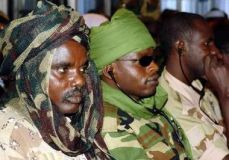Darfur talks halt over al-Bashir’s bid for AU chair
Jan 23, 2006 (ABUJA) — Peace talks between parties to the conflict in Sudan’s Darfur region ground to a halt on Monday as rebel delegations withdrew to await the result of President Umar al-Bashir’s bid to win the chairmanship of the African Union.
 The Sudanese leader is a key candidate to take over from Nigerian President Olusegun Obasanjo, the exiting president of the pan-African organisation, whose summit opened in Khartoum on Monday.
The Sudanese leader is a key candidate to take over from Nigerian President Olusegun Obasanjo, the exiting president of the pan-African organisation, whose summit opened in Khartoum on Monday.
But both the Sudan Liberation Movement/Army (SLM/A) and the smaller Justice and Equality Movement (JEM), which have been fighting al-Bashir’s government in the country’s western Darfur region, have threatened to quit the talks if he wins the AU presidency. They allege that his chairmanship would diminish the credibility of the peace process in Darfur being mediated by the organisation.
“We are boycotting the talks for Monday and Tuesday” to await the outcome of the summit, said Ahmed Tugod Lissan of JEM, speaking on behalf of the two rebel groups, which last week announced they were forming a political-military alliance.
“If Sudan emerges chairman it will undermine both the AU itself and the peace process,” he told reporters on Monday. “It can go to any other country but Sudan.”
African officials privately acknowledge the awkwardness of having Sudan direct the continent’s affairs at a time when the AU is actively mediating in its internal conflict.
The chairmanship of the 53-nation organisation has traditionally been handed to the country hosting the AU summit, but there is no formal obligation to do so. Observers note that the extension of Obasanjo’s term is an option.
Sam Ibok, a senior AU official at the peace talks in Abuja, said mediators are equally awaiting the outcome of the Khartoum summit. He told reporters that one option under consideration was to have the Darfur talks remain under the direction of Obasanjo if al-Bashir takes the helm of the AU.
“Whether the rebels will accept this, we will have to see,” he said. “But if one party to the negotiations walks out, then there will be no talks and everything will come to a standstill.”
The Darfur conflict erupted in early 2003 when JEM and SLM/A took up arms against Khartoum to end what they call the neglect and oppression of the mainly black inhabitants of Darfur, a semi-desert region the size of France. The Sudanese government responded by backing Arab militias known as the Janjawid.
So far, the 15 months of talks in Nigeria between the rebel groups and the Sudanese government have made little progress beyond a fragile ceasefire, frequently broken by all sides. Unarmed civilians are still being targeted by gunmen and the AU force of 7,000 on the ground lacks the funds and military capacity to protect civilians against attack.
Humanitarian workers estimate that more than 180,000 people have been killed and nearly two million forced to flee their homes because of the bloodshed. The UN special envoy for Sudan Jan Pronk has called for an international force of between 12,000-20,000 to protect civilians against attacks and separate the warring sides.
(IRIN)
